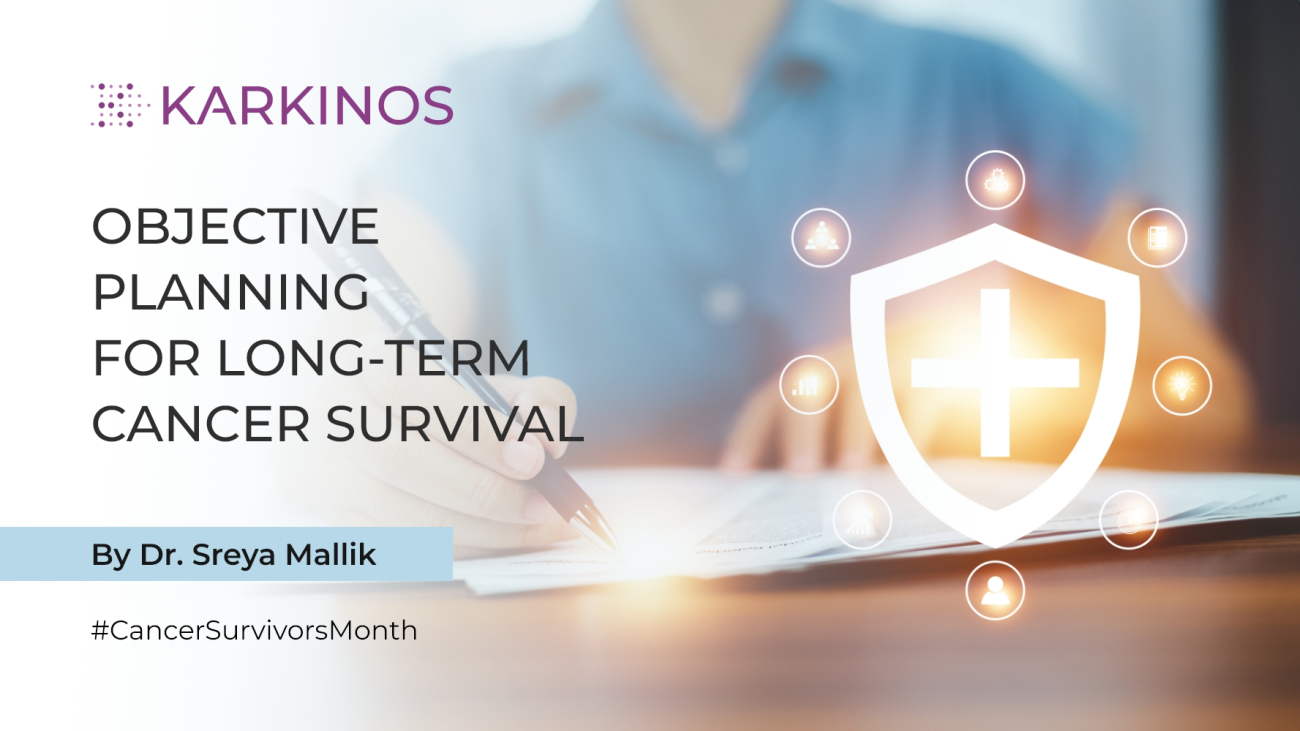Multidisciplinary Cancer Survivorship Care Plan - Why is this important for long-term cancer care?
By Dr. Sreya Mallik, Consultant Medical Oncologist, Karkinos Healthcare, West Bengal
Cancer is a global public health problem and it remains a leading cause of death worldwide. Early detection, cancer-directed therapies, and supportive care are the keys to successful cancer care. With continued advances in strategies to detect cancer early and treat it effectively, the number of individuals living years beyond a cancer diagnosis is also increasing over the past several decades.
Advances in the treatment of childhood malignancies lead to excellent long-term survival among pediatric cancer patients. Medical and sociocultural factors such as psychosocial and behavioral interventions, active screening behaviors, and healthier lifestyles may also play an integral role in the length and quality of survival.
Definition of Survivorship
Cancer survivorship encompasses the entire cancer continuum, from the initial diagnosis through the remainder of a cancer patient’s life. National Coalition for Cancer Survivorship and National Cancer Institute defines survivors as individuals with cancer from the time of diagnosis and for the balance of life, and include in their definition family, friends, and caregivers of individuals with cancer. In cancer, survivorship focuses on the health and life of a person with cancer post-treatment until the end of life. As the number of cancer survivors is growing, it emphasizes the demand for specialized needs of disease-free cancer survivors.
Challenges in Cancer Survivors
The post-treatment survivorship phase presents diverse and unexpected challenges that are affected by clinical, individual, and socioeconomic factors. Cancer treatment modalities including surgery, radiotherapy, chemotherapy, endocrine therapy, and immunotherapy are associated with late effects that may persist for up to 20 years after treatments.
Long-term consequences of cancer therapy lead to physical effects, cognitive impairments, functional decline, and psychosocial issues (e.g. fear of cancer recurrence, body image concerns, and anxiety). Short- and long-term consequences can hamper the cancer survivor’s daily life. Workability can be affected and overall quality of life also can be worsened.
Both acute organ toxicities (e.g. radiation pneumonitis, fatigue, mucositis) and chronic toxicities (e.g. congestive cardiac failure, neurocognitive deficits, delayed bone growth, renal dysfunction, infertility, and second malignancies) are being described as the price of cure or prolonged survival. The study of late effects, originally started with pediatric cancer, is now being applied to cancer survivors of all ages because concerns may continue to surface throughout their life. Second primary malignancies among cancer survivors account for 16% of all cancer incidences. Chemotherapy and radiation are linked to secondary malignancies, and individuals at high familial risk are at increased risk of developing treatment-related malignancies (e.g., through aberrations in DNA repair pathways). As this vulnerable population of cancer survivors is growing, there is not only a need for more public awareness but also enhanced expertise and knowledge from (healthcare) professionals.
Survivorship Goals
Traditional delivery systems for cancer care have limited capacity to provide access to quality, long-term health care for the growing number of cancer survivors. The survivorship care plan should include issues related to the
- Ability to get health care and follow-up treatment
- Late effects of cancer treatment
- Second cancers
- Quality of life
Cancer survivors need a good quality of life in terms of physical well-being, psychological well-being, social well-being, and spiritual well-being. A good survivorship care plan leads to improvements in perceived knowledge and quality of survivorship care. The survivorship care plan is a guide for outlining and coordinating follow-up care, including surveillance tests, recommended health behaviors, and education about and monitoring of potential long-term effects of cancer treatment.
Rehabilitation interventions like medication, counseling, physiotherapy, behavior therapy, promotion of healthy diets & physical activity are essential for maintaining a good quality of life.
Adherence to cancer screening guidelines for breast, cervical, and colon cancer by health care providers, yearly gynecologic examinations (pap smears), and annual ophthalmological evaluations is required for cancer survivors. Screening and providing counseling to patients regarding familial cancer syndromes and testing for inherited mutations conferring increased risk of cancer are the important pillars of a survivorship care plan.
The survivorship care plan should be multidisciplinary. Care should be coordinated by the patient’s physician or advanced practiced nurse, with the availability of a mental health provider.
The care plan should include:
- Nutritional evaluation
- Psychological evaluation
- Social work assessment
- Evaluation by physical therapy and occupational therapy
- Coordination of care with other physicians.
Oncologists and primary care providers have to take responsibility for incorporating interventions into routine care for cancer survivors. The survivorship care plan should be first delivered at the end of the proposed cancer treatment.
Survivors of Childhood Cancers
Almost 80% of children and adolescents who receive a diagnosis of cancer become long-term survivors. Apart from physical disabilities and developmental delays, survivors of childhood cancers are also at risk for psychological distress and pain. Certain groups of childhood cancer survivors, including those with a chronic medical condition, female sex, and lower education and socioeconomic status, are at high risk for psychological distress, neurocognitive dysfunction, and poor health-related quality of life, suggesting the need for targeted interventions in these high-risk groups. Adolescent and young adult cancer survivors have a higher relative risk of secondary malignant neoplasms compared with the general population. Early interventions are needed to prevent the late effects.
Barriers to providing high-quality, patient-centered survivorship care include lack of evidence, lack of a trained survivorship workforce, lack of reimbursement structures, and lack of a proper health care system. As cancer care continues to improve and the survivor population continues to grow, conducting research to address knowledge gaps and barriers in survivorship care will be necessary.
This will be critical to enhance health outcomes and quality of life among survivors and to ensure that every survivor experiences an optimal and patient-centered journey.
About Dr. Sreya Mallik,
 Dr. Sreya Mallik is Consultant Medical Oncologist at Karkinos Healthcare Private Limited. She is qualified with an MBBS from R. G. Kar Medical College & Hospital, West Bengal and an MD in Radiation Oncology from Medical College, Kolkata, West Bengal. She received her DM in Medical Oncology from Dr. B. Borooah Cancer Institute (A Unit of Tata Memorial Centre, Mumbai), Guwahati, Assam.
Dr. Sreya Mallik is Consultant Medical Oncologist at Karkinos Healthcare Private Limited. She is qualified with an MBBS from R. G. Kar Medical College & Hospital, West Bengal and an MD in Radiation Oncology from Medical College, Kolkata, West Bengal. She received her DM in Medical Oncology from Dr. B. Borooah Cancer Institute (A Unit of Tata Memorial Centre, Mumbai), Guwahati, Assam.
Dr. Mallik has received certifications in Palliative Care from the Indian Association of Palliative Care and in the Specialty Examination in Medical Oncology 2022 from the Federation of Royal Colleges of Physicians of the United Kingdom. She actively participates as a member of various professional organizations, including AROI (Association Of Radiation Oncologist of India), AONEI (Association of Oncologist of North-East India), and ESMO (European Society Of Medical Oncology).
With 15 years of experience, Dr. Mallik specializes in managing various types of solid malignancies, with a particular focus on breast cancer, lung cancer, gynaecological malignancies, and gastrointestinal malignancies. She also has expertise in treating pediatric malignancies and hematological malignancies such as lymphoma and leukemia. Dr. Sreya is well-versed in the use of modern chemotherapeutic drugs, targeted therapy, and immunotherapy.
Dr. Mallik has made significant contributions to the field of oncology. She has published numerous research papers in reputable journals and has served as a co-author of chapters in books such as “Principle & Practice of Oncology,” “Triple C in Cancer,” and “Principle & Practice of Common Cancers.”
